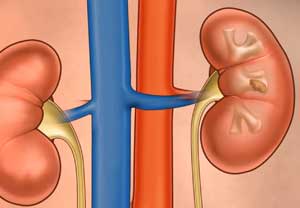Washington, DC (December 15, 2011) — Certain measures of kidney health may predict who is likely to die prematurely, according to a study appearing in an upcoming issue of the Journal of the American Society Nephrology (JASN). The findings suggest that some markers of kidney function are better than others at predicting an individual’s prognosis.
A person’s level of kidney function often indicates how likely they are to develop kidney failure and other conditions. Kidney function is most accurately represented by the kidneys’ filtration rate, but this is difficult to measure. Therefore, blood levels of a protein called creatinine are commonly used to assess kidney function, but levels of two other blood components—cystatin C and beta trace protein—are newly proposed markers that may be better predictors of individuals’ future health. It’s thought that these markers may go beyond indicating kidney health to include other aspects of an individual’s well being.
To see how well these markers predict people’s future health, Navdeep Tangri, MD, Mark Sarnak, MD MS (Tufts Medical Center), and their colleagues analyzed data from the Modification of Diet in Renal Disease Study, which provided levels of these markers for 816 kidney disease patients who were then followed for an average of 16.6 years.
The researchers found that, independent of the kidneys’ filtration rate, participants with higher creatinine had a higher risk of developing kidney failure, but a lower risk of dying. Those with higher cystatin C and beta trace protein had a higher risk of both kidney failure and death.
These results suggest that creatinine, beta trace protein, and cystatin C may be predictive of aspects of health that go beyond the kidneys. Beta trace protein and cystatin C appear to provide more consistent prognostic information than creatinine.
Future studies should investigate whether a panel of markers of kidney function would provide a better prediction of an individual’s prognosis than any one marker alone.
Study co-authors include Lesley Inker, MD, Hocine Tighiouart, Eric Sorensen, Andrew Levey, MD (Tufts Medical Center); Vandana Menon, MD, PhD (Tufts Medical Center and Outcome Sciences); Gerald Beck, PhD (Cleveland Clinic Foundation); Michael Shlipak, MD (San Francisco Veterans Affairs Medical Center and University of California, San Francisco); and Josef Coresh, MD, PhD (Johns Hopkins University).
Disclosures: The authors reported no financial disclosures.
The article, entitled “Filtration Markers Have Prognostic Value Independent of Glomerular Filtration Rate” will appear online athttps://jasn.asnjournals.org/ on December 15, 2011, doi: 10.1681/ASN.2011070663.
The content of this article does not reflect the views or opinions of The American Society of Nephrology (ASN). Responsibility for the information and views expressed therein lies entirely with the author(s). ASN does not offer medical advice. All content in ASN publications is for informational purposes only, and is not intended to cover all possible uses, directions, precautions, drug interactions, or adverse effects. This content should not be used during a medical emergency or for the diagnosis or treatment of any medical condition. Please consult your doctor or other qualified health care provider if you have any questions about a medical condition, or before taking any drug, changing your diet or commencing or discontinuing any course of treatment. Do not ignore or delay obtaining professional medical advice because of information accessed through ASN. Call 911 or your doctor for all medical emergencies.
Founded in 1966, and with more than 12,000 members, the American Society of Nephrology (ASN) leads the fight against kidney disease by educating health professionals, sharing new knowledge, advancing research, and advocating the highest quality care for patients.



